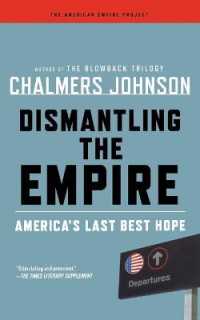- ホーム
- > 洋書
- > 英文書
- > Politics / International Relations
Full Description
Unlike other books on the Arab uprisings of 2010-2011 which focus on why they occurred, this book looks instead towards the future of three countries—Syria, Libya, and Yemen—where the violence and instability initiated by the uprisings persist. It additionally examines the case of Iraq which continues to suffer from a precarious political situation introduced by the US-led invasion of 2003. The book investigates what should be done to achieve inclusive political and economic development and eventually a lasting peace. It describes the particular circumstances in each of the four countries, and analyses the common challenges facing them such as the need to achieve economic diversification, control inflation, raise employment levels, husband fiscal expenditures, control corruption, and implement transparent policies. It argues that in the four countries any lasting settlement must involve an explicitly stated new social contract that lays the foundation for inclusive socio-economic development and a genuinely democratic environment. In addition, a massive transformation is required of the institutional fabric of society, that is, the set of key institutions that helped create the conditions for conflict. Moreover, the book argues that any successful transition hinges on anticipating the potential for political and economic development that an eventual peace agreement will open. This can only be done by envisioning and planning the reforms that ought to be implemented, and building up political support for the transition phase.
Contents
Introduction: On the Causes of Conflict and the Premises for Reconstruction
Part I: Post-Conflict Development and Democratic Governance
1. Economic Agenda for Post-Conflict Reconstruction
2. Grievances and Civil Wars: The State of The Literature
3 Power-sharing and Peace-building
Part II: Country Studies
4. Causes, Consequences, and Future Directions of the Syrian Conflict
5. Conflict, Institutions and the Iraqi Economy, 2003-2020
6. Conflict, Peace-Building, and Post-Conflict Reconstruction in Yemen
7. Investigating the Libyan Conflict and Peace-building Process: Causes and Prospects
Concluding Remarks



![とく問?カード 中学2年国語 [バラエティ]](../images/goods/ar2/web/imgdata2/49099/4909961089.jpg)




